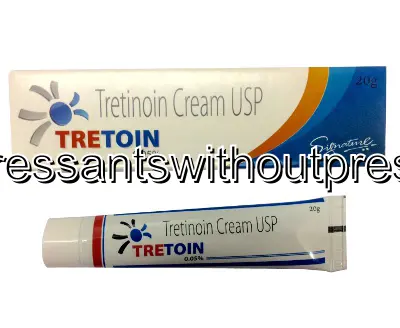Buy Tretinoin Online in New Zealand — No Prescription Needed
| Package | Dosage | Price | Price per Dose | |
|---|---|---|---|---|
| Dosage: 0.1% | ||||
| 5 tube | 0.1% | NZD270.63 | NZD54.13 | |
| 4 tube | 0.1% | NZD238.15 | NZD59.55 | |
| 3 tube | 0.1% | NZD211.09 | NZD70.37 | |
| 2 tube | 0.1% | NZD156.96 | NZD78.49 | |
| 1 tube | 0.1% | NZD94.70 | NZD94.70 | |

Tretinoin Description
Overview of Tretinoin
Tretinoin, also known by its chemical name all-trans retinoic acid, is a powerful medication primarily used to treat acne and reduce signs of aging. It is a derivative of Vitamin A and works by promoting the rapid turnover of skin cells. This process helps prevent the formation of acne pimples and promotes smoother, more even skin. Tretinoin is available in various formulations, including creams, gels, and lotions. It is typically prescribed by dermatologists and used under medical supervision to achieve optimal results.
Effectiveness and Benefits
Many users find tretinoin highly effective in clearing acne and improving skin texture. Its ability to normalize keratinocyte shedding prevents pore blockage, a common cause of acne. Besides its anti-acne properties, tretinoin is also valued for its anti-aging effects. It stimulates collagen production, which can reduce the appearance of fine lines and wrinkles. Regular use of tretinoin may also diminish hyperpigmentation and promote a more youthful, radiant complexion. However, changes may take several weeks to become noticeable, and consistent application is essential for best results.
Application and Usage
When using tretinoin, it is important to follow the instructions provided by a healthcare professional. Usually, a small amount is applied once daily in the evening after washing the face. Users should avoid applying tretinoin on broken or irritated skin, as it can cause increased sensitivity. It is recommended to start with a lower concentration to minimize initial irritation. Sunscreen use during the day is crucial, as tretinoin increases skin sensitivity to sunlight. Patients should also avoid harsh skincare products, such as alcohol-based toners or abrasive scrubs, during treatment.
Potential Side Effects
While tretinoin is effective, it can cause side effects, especially at the beginning of treatment. Common adverse reactions include redness, peeling, dry skin, and increased sensitivity to sunlight. These effects usually diminish with continued use as the skin adapts. To reduce irritation, users are encouraged to moisturize regularly and use gentle skincare products. Rarely, some individuals may experience severe redness or irritation, requiring medical consultation. It is important to report any persistent or worsening side effects to a healthcare provider.
Precautions and Recommendations
Tretinoin should be used with caution in pregnant or breastfeeding women, as it may pose risks to the fetus. Individuals with sensitive skin or certain dermatological conditions should consult a healthcare professional before starting treatment. Avoiding excessive sun exposure and using protective clothing are essential during tretinoin therapy. If a patient experiences severe burning, blistering, or swelling, they should seek medical advice promptly. It is also vital not to combine tretinoin with other potentially irritating products unless directed by a healthcare provider.
Conclusion
Tretinoin remains a highly regarded medication in dermatology for its ability to improve skin conditions and slow signs of aging. Its effectiveness depends on correct application and patience. While it can cause skin irritation initially, proper use and precautionary measures can minimize side effects. As with all medications, consulting a healthcare professional before use ensures safe and effective treatment tailored to individual skin needs. Regular follow-up helps monitor progress and address any concerns during therapy.
See Also

